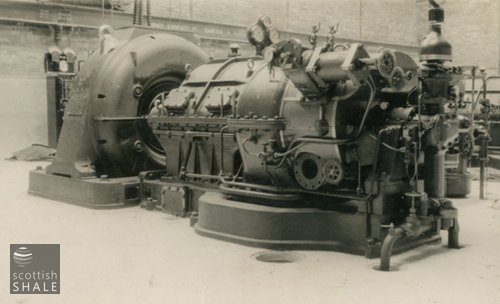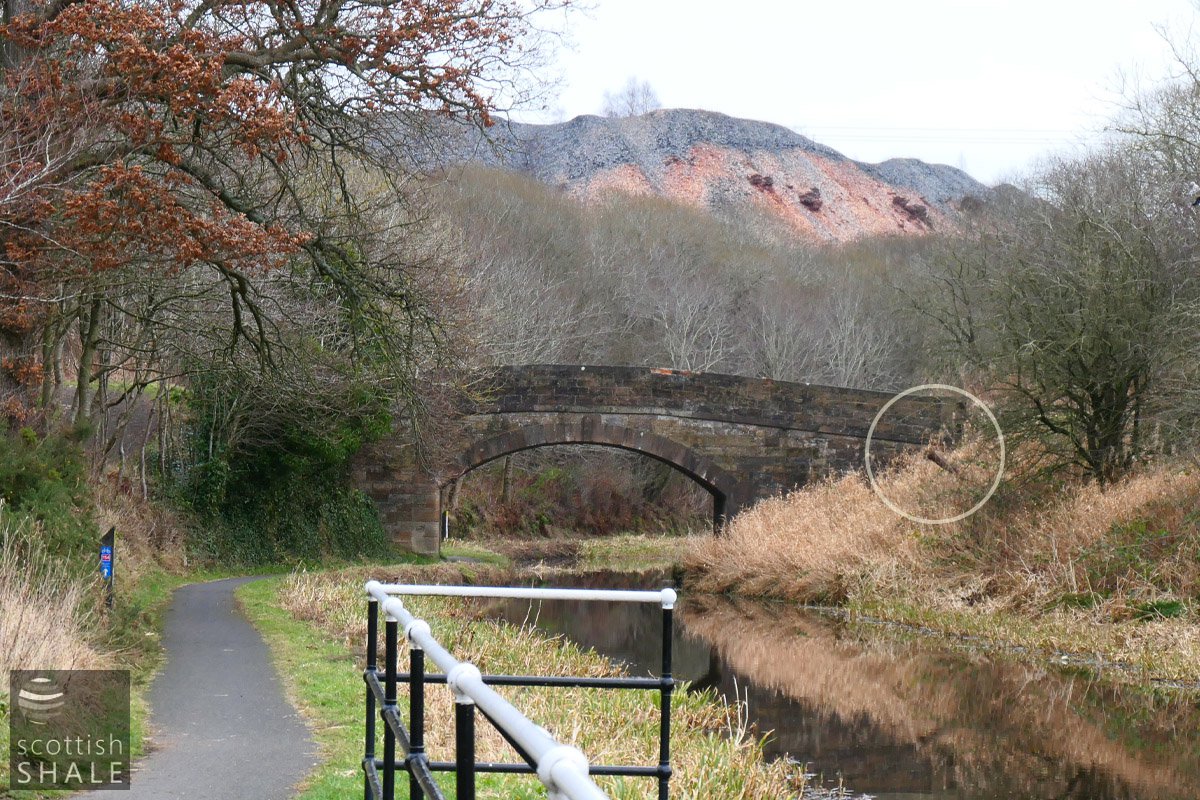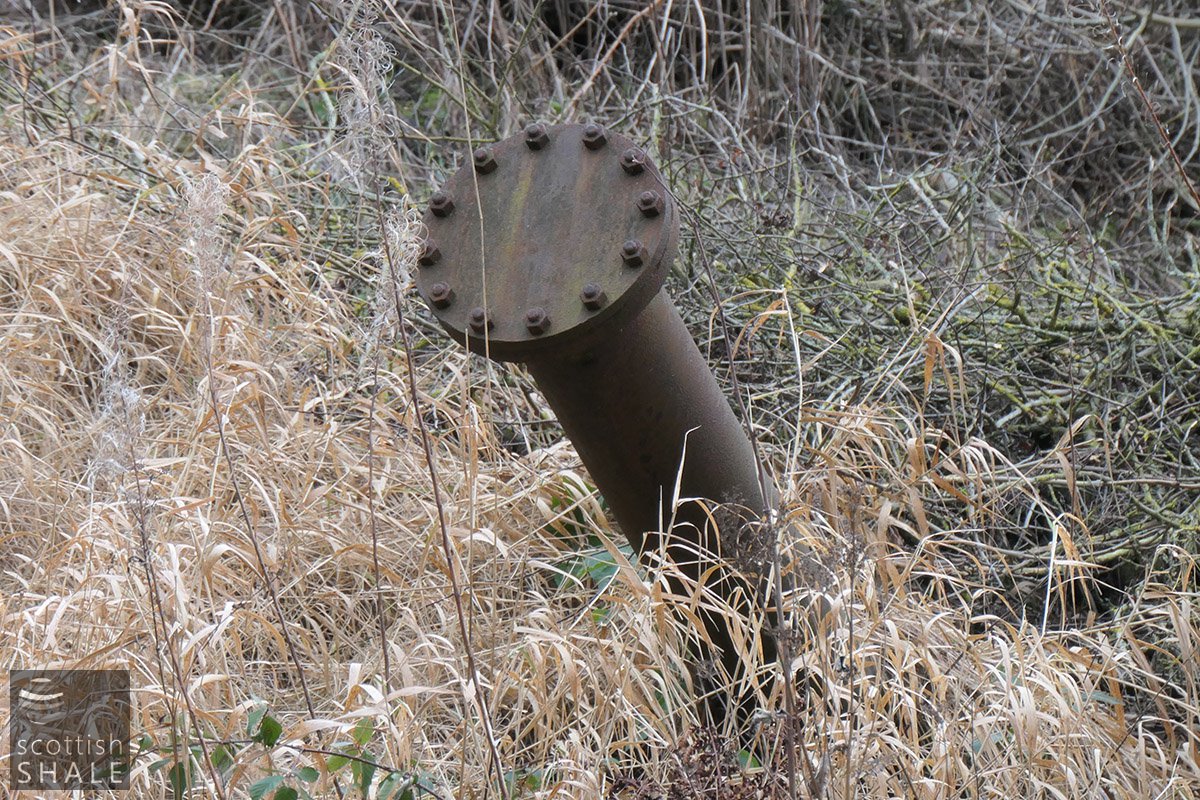Grangemouth to Uphall pipeline
Immediately after World War One, a shortage of shale miners restricted the output of crude shale oil, and many of Scotland's shale oil refineries lay silent. During the conflict Britain's overseas oil interests had rapidly expanded, and increasing volumes of Persian crude oil began to be imported. By 1920, plans were being drawn up for a new refinery to process Persian crude at Grangemouth, a location well placed to tap into the expert workforce of the shale oil industry. Before finalising plans for the Grangemouth plant, crude oil was sent to some of the under-used shale refineries to help perfect the design for the necessary equipment. Most of this experimental work took place at the former Young's company oil works at Uphall, where the first consignment of Persian crude arrived in June 1920
It became apparent that Persian crude behaved very differently to crude shale oil during the refining process, and after more than a year spent tinkering with the process, many parts remained problematic. Visits were paid to Anglo-Persian's Llandarcy works, which had just started production, but it was not until Alexander C. Thomson of the Oakbank oil company was brought in to oversee matters that processes were perfected. The Oakbank company had gained some experience of refining imported oils during the 1880's and 90's. Thomson went on design new refinery plant at Uphall and at Grangemouth.

Refining capacity was quickly ramped up, and by 1924 a fleet of 60 rail tank wagons were engaged in shuttling Persian crude between the oil terminal at Grangemouth and the refinery plant at Uphall. It was at this stage the Scottish Oils M.D. William Fraser came up with a bold scheme for a network of pipelines to link Grangemouth terminal and refinery with many of the shale oil works. Plans were ultimately reined back to a single 8” pipeline following a thirteen and a half mile route between Grangemouth and Uphall. This undertaking required securing the consent of fifteen landowners, although parts of the route were able to follow the wayleaves of existing mineral railways owned by Scottish Oils. Construction of the pipeline cost £30,000, and a large electrically powered ram pump was installed at Grangemouth to force crude oil along the pipeline at a rate of 18,000 gallons per hour.
Further new refining plant was constructed at Uphall to process Persian crude and the old parts of the works that once extracted and refined shale oil were demolished. New cracking plant was installed at Uphall in 1929, enabling most of the output to be converted to road fuels that enjoyed a preferential rate of excise duty. Advertising campaigns promoted the advantages of BP petrol, described as “a high grade spirit specially refined for the Scottish market at the Grangemouth and Uphall refineries of Scottish Oils, Limited.
The Uphall refinery closed in 1936, made redundant by the continued growth of Grangemouth. Presumably the pipeline then served no further useful purpose, and was abandoned. Large parts of the pipeline are likely to survive, slowly decaying beneath the fields of West Lothian. The pipeline is known to have followed the route of the railway that once linked James Ross' shale pits with Philpstoun oil works. This railway crossed the Union Canal on an arched stone bridge in the shadow of the Philpstoun bings. In the undergrowth just beside the bridge, a blanked-off pipe, a blanked-off piece of steel pipe still points expectantly into the air. This will once have formed a pipe bridge arching across the canal, and seems just in the right place to have been part of the pioneering pipeline.

Stub end of a former pipe bridge across the Union Canal at Philpston, likely to have been part of the oil pipeline. 15th January 2022

Close-up of the blanked off pipe, 15th January 2022
Indicative route of the pipeline.
- Thomas Howie, Paddockhall
- A. Gibson McLagan. Pumpherston,
- James Turnbull, Kinniel Kerse, and
- Thomas Kirk, Northpark,
- James Paul, Walton,
- John Paul, Carriden,
- Thomas Imrie, Kingiass,
- George Kirkwood, East Kerse Mains,
PIPE LINE.
The Chairman submitted proposals by Mr. W. Fraser for the laying of a Pipeline from Grangemouth to Uphall, and should need arise, for supplying the other refineries in the Shalefield. The route proposed is some 13 1/2 miles long and involves wayleave with some 15 different proprietors and 2 public authorities, and Mr. Fraser is now in a position to make arrangements with these to lay and maintain 4 pipe-lines for a single payment of £3,000.
He proposes at present however only to lay one pipeline ·the cost of which is estimated at £30,000. The cost of supplying Uphall just now is £21,000 per annum for railway carriage, handling tanks at Grangemouth and Uphall, and tank wagon hire, but with the installation of the pipeline this would practically all be saved, and besides there would be set free for other purposes the 60 rail tank was at present employed on this traffic. The installation would show a very substantial return and would greatly facilitate operations. The Board approved of Mr. Fraser's proposals and resolved to sanction him to proceed with the scheme for the laying of one pipeline, the pipe to be either a 6" or a 8" one, as he might consider best.
Scottish Oils Ltd, Minutes of Directors' Meeting, 28th January 1924
.......
It was reported that Four Grants of Servitude in favour ot the Company by
in respect of the pipe track for conveying oil from Grangemouth to Uphall, were executed on behalf of the Company on 6tb June, 1924, which was confirmed. It was reported that Minute of Agreement, in duplicate, between the County Council of the County of West Lothian and the Linlithgow and Bathgate District Committees of the first part, and the Company of the second part, relating to the laying etc. of the pipe-line from Grangemouth to Uphall, was executed on behalf of the Company on 21st June, 1924, which was confirmed. Agreement in duplicate, between the Bo'ness Town council and the Company relating to the laying etc. of the pipe track through Kinneil Estate, was submitted_and approved, and it was resolved that it be executed on behalf of the Company. Four engrosaments of Grants of Servitude in favour of the Company by:-
in respect of the pipe track for conveying oil from Grangemouth to Uphall, were submitted and approved, and it was resolved that they be executed on behalf of the Company.
Meeting of Directors of Scottish Oils Ltd. 23rd June 1924. See full record 100658
.......
It was reported that on 2nd July, l924, Grant of Servitude by Sir James Dalyell, Bart. relating to the laying etc. of the pipeline from Grangemouth to Uphall, through the lands of Binns, was executed on behalf of the Company
Meeting of Directors of Scottish Oils Ltd. 30th September 1924. See full record 100658
.......
It was reported that on 6th October, 1924, Grant of Servitude by the Marquiss of Linlithgow with the consent of the Hopetoun Estate Development Company and the Marchioness of Linlithgow in connection with the pipeline from Grangemouth to Uphall, was executed on behalf of the Company, which wasconfirmed. It was reported that on 15th October, 1924, Grant of Servitude by the Earl of Buchan and others in connection with the pipeline through the lands of Strathbrock, was executed on behalf of the Company, which was confirmed
Meeting of Directors of Scottish Oils Ltd. 4th November 1924. See full record 100658
.......
It was repcrted that on 11th November, 1924, Grant of servitude by the Conmissioner for the Hamilton Trustees, in connection with the pipeline from Gra ngemouth to Uphall, was executed on behalf of the Company, which was confirmed
Meeting of Directors of Scottish Oils Ltd. 24th November 1924. See full record 100658
.......
INSURANCE OF PIPELINE ... GRANGEMOUTH TO UPHALL. The question of insuring against damage from Fire or Explosion the Pipeline from Grangemouth Refinery to Uphall Refinery together with the Pump-houses and Machinery therein, was considered. It was decided to cover the Pump-houses and Machinery but not the Pipeline
Meeting of Directors of Scottish Oils Ltd. 27th January, 1925. See full record 100658
DEVELOPMENTS AT UPHALL
At Uphall the refining of Persian crude oil proeeeded satisfactorily, although the reduction in the prices of products here also affected financial results. Arrangements are now in hand for the further development of refining operations at Uphall, which will take the direction of working up more fully the heavier products with we hope a consequent improvement on the financial results of operations there . I hope the plant for this purpose will be in operation within tho current financial year although we cannot expect to obtain any material benefit from it during that period. At present the supplies of Persian crude oil for Uphall are conveyed from Grangemouth by means of railway tank waggons , which entails keeping a large number of these travelling tanks constantly on traffic , with a resultant very heavy bill for haulage. In view of the scale on which these operations at Uphall are now carried on, it was evident that the laying of a pipeline to convey the crude oil from Grangemouth to Uphall would effect a large saving on the cost of transport . A route, fourteen miles in length, was surveyed by our engineers, and the work of laying the line is now proceeding . We have made satisfactory arrangements with the proprietors of the ground through which the line will pass , and I anticipate that within a few months we should be able to take crude oil from tank steamers lying at our own jetty at Grangemouth into the large storage tanks on the refinery site, and thence through this pipeline to the refinery at Uphall . Not only will this facilitate operations at Uphall , but as already mentioned , it will give us a substantial saving in railway carriage , and set free a large number of railway tanks for other produce
Chairman's report to the fifth annual general meeting of Scottish Oils (Ltd.) Reported in The Scotsman, 12th June 1924
.......
For the storage of supplies of crude oil to keep the refinery in operation between the arrivals of cargoes and for the accumulation of finished products, a group of ten tanks, each of 8000 tons, have been erected, but extensive as it is, that capacity has proved to be quite insufficient for the requirements of the refinery even at this comparatively early stage. Close to these tanks are the . pump houses, each containing a series of electrically propelled pumps which convey the supplies of crude material and finished products between the ship, storage tanks, and the refinery. Here also is situated a large ram pump which forces crude-oil , at the rate of about 18,000 gallons per hour through the new pipe-line supplying the refinery at Uphall, 14 miles away.
The Scotsman, 25th November 1924

